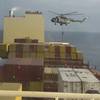TT Club Warns Baltic Ports to Protect Against Reputational Damage
Speaking during Baltic Transport Week in Gdansk this week Andrew Huxley, Development Director at freight transport insurance specialist TT Club, warned port and terminal operators to be aware of the reputational damage that can be a serious consequence of uninsured incidents resulting from avoidable risks.
It is estimated that for every unit cost incurred in insurance claims it can cost between eight and thirty-six times that amount in direct and indirect uninsured losses for the business involved*. Such expenses may accrue from the emergency supplies required to normalise the situation, operational delays, increased maintenance and training requirements after the event but particularly reputational and commercial damage that can affect business for some time. For the port and terminal sector, Huxley highlighted that TT Club’s own claims analysis concludes that 88% of the cost of insured claims result from operational inadequacies or poor maintenance; the vast majority of such shortcomings being avoidable.
“Our research, covering over 7,000 claims of a value in excess of US$10,000 made over the last five years, has sought to be precise in identifying the root cause of claims, which gives us a significant advantage in advising on preventative measures. The overwhelming conclusion is that much can be done to reduce future claims, improve safety and security in Baltic ports and prevent erosion to the profitability of terminal operators in the region,” commented Huxley.
Though wide-ranging in its scope, Huxley chose to concentrate on the analysis’ findings regarding theft, cargo contamination and bodily injury. These types of claims are high on the list of the most damaging, not just in terms of financial loss but particularly, if they become repetitive, to the reputation of an operator. Consequent loss of custom and revenue can be ultimately more critical to a cargo handling business than the loss caused by the initial incident.
Theft from an operator’s premises (at 55% of all theft claims) and from sub-contractors while in transit (at 30%) are the two main areas of concern. “Physical security measures such as fencing, guards, alarms and CCTV are the most obvious preventions”, highlighted Huxley in his presentation, “But crime using the internet is an emerging risk with hackers accessing cargo release codes, changing delivery locations and altering inventory stock levels remotely”, he warned.
Perhaps not surprisingly nearly 80% of bodily injury claim costs involve mobile terminal equipment and vehicles in ports. The circumstances causing danger are often obvious to those that work in the environment and as such prevention should be higher on operators’ priority lists. “Employment of traffic management systems, anti-collision devices and good, regular driver training are not initiatives that require massive investment and state-of-the art technology, rather just sensible and practical operational management”, emphasised Huxley. Indeed, a key message from the TT Club is that training and review of systems often will not involve significant capital expenditure but can have a major impact on reducing incidents and improving productivity.














